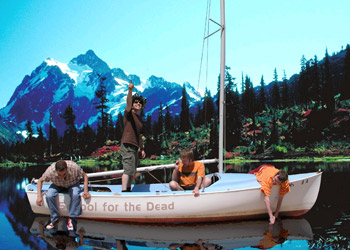This week, School for the Dead, one of the main projects of Northampton musician Henning Ohlenbusch, celebrates 10 years of music-making. If this School has a school, it’s perhaps best described as big-hearted, inventive pop. The tunes are full of upbeat moments, layered vocals and a wide instrumental palette. It’s got no clear devotion to any particular era in pop history. The band possesses a particularly solid Valley musical pedigree, with two members who played in Northampton powerhouse Aloha Steamtrain, and all its members showing up in the lineups of incredibly long lists of Northampton-based bands of many a stripe.
Their 10-year mark puts them in a growing category of Valley musicians who’ve been around long enough to have a broad view of the percolations of Western Mass. pop and rock bands, and who have made music here long enough to have comfortably dedicated themselves to a definite place in our musical geography.
School for the Dead’s Principal Ohlenbusch recently weighed in about the big view of Valley music and about making music with fellow School for the Dead members Brian Marchese, Max Germer, Ken Maiuri and Tony Westcott.
About the differences between playing in the Valley in the ’90s and now, Ohlenbusch says, “I don’t know that there is much difference between the scene back then and now. To me personally, there is a big difference, since so many friends have moved away, venues have closed, bands have broken up. I don’t spend as much time out at music venues as an audience member as I used to, so I am not as surrounded by the scene as I once was.
“There’s still plenty of live music happening weekly here in Northampton,” says Ohlenbusch. “I look back fondly at how many bands used to be very serious and focused on their music back in the ’90s in this town. Bands constantly played shows, and went on tours, recorded albums, and strove to get better and better. I’m sure that’s still happening all around us.”
He adds that the band’s longevity is in large part due to the friendships and mutual admiration among the five. “Because of this shared admiration, our live shows will never bore us, because we all have the freedom to do whatever we feel like,” says Ohlenbusch. “If Ken want’s to play a super-fast keyboard part that sounds like a banjo, or if Tony wants to suddenly explode in a feedback screech, it’s cool. We all know we have nothing to worry about with each other because we all just want to do what is best for the song, or the audience, at any particular time. If Max and Brian start playing ‘Fool on the Hill’ out of nowhere, we’ll just go with it and see what happens—that just happened at our April Fool’s show.”
It also helps, he adds, that School for the Dead is sometimes a band of one (just Ohlenbusch), at other times any number up to the full complement of five. Perhaps the most important reason for the band’s longevity, says Ohlenbusch, is that “I simply will not let any of the guys leave the band. They may want to, but I force them into staying through verbal threats, blackmail, or, if necessary, handcuffs.”
In addition to music-making, Ohlenbusch began the record label Rub Wrongways, a highly personal musical gathering. About the label he says, “The motto of our label, Rub Wrongways Records, is, ‘It’s a record label. No, it’s not.’ I’m not even sure what a label is these days. There are so many of them. For me, it is a place to bring together the music of my friends and put it all under one roof.”
Will School for the Dead play for another 10 years? “I certainly hope so,” says Ohlenbusch. “I don’t see why not. I’m fairly certain that I will be writing and recording music for my whole life. I haven’t slowed down yet. I don’t see why I would.”
He points to some of the Valley’s notable long-term successes—Ray Mason and the Lonesome Brothers—as good examples to emulate, but adds a simpler motivation: “I hope we keep playing—this is my favorite band.”
School for the Dead and opener Andrew Emmons play April 16, 8 p.m., Montague Bookmill, 440 Greenfield Road, Montague, (413) 362-9206.



